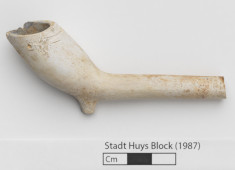Introduction: Lots 8, 9, and 15 are modern designations for adjacent parcels of land that were owned together and used as a single property until the early 1830's. Excavations produced important discoveries like that of the Colonial-era Lovelace Tavern, proving that significant archaeological resources could still exist in urban spaces. Project archaeologists were able to lobby for increased time and funds to continue their work on the strength of these finds, leading to additional discoveries. In all, the project provided considerable information about the history of New York City and its inhabitants from the 17th to the 20th centuries.
The tavern was constructed by the second English Governor of New York, Francis Lovelace, around 1670. Taverns were important spaces for colonial communities, serving as centralized meeting places that fulfilled important social, recreational, political, and economic functions. Lovelace Tavern became New York's temporary City Hall starting in the late-17th century after the Stadt Huys fell into disrepair and was demolished in 1706.
Rationale: Remains of the Lovelace Tavern were first encountered during the excavation of Test Cut AQ. Overall, archaeologists excavated 27 test cuts inside, adjacent to, or within the walls of the tavern, representing around fifty-percent of the total area. Test Cut BN was a 3- by 3-foot unit placed partially within the interior of the 17th/18th century Lovelace Tavern. Stones from the Tavern's eastern wall were found in the middle of the test cut, effectively separating the unit into eastern and western halves. The western half was once inside of the Tavern and contained artifacts and soils dating to its use. The eastern half would have been outside of the Tavern walls and did not contain the same type of archaeological information. Additionally, part of Feature 14, a posthole found in Test Cut BF, was also encountered in the northwestern corner of Test Cut BN.
Results: The soils excavated in this level were found directly outside of the Lovelace Tavern. Archaeologists were not able to determine if the artifacts were related to tavern activities or dated to the same time period. The color and texture of the soil is similar to that of the subsoil found in the western part of the test cut.
Lot 9, Test Cut BN, Strata IV, Level A
-
Collection method
Trowel, Screen (1/2-inch mesh). Arbitrary 4-inch Level.
-
Soil description
Red Sand
-
Munsell
10YR 5/6 - 10YR 5/8

